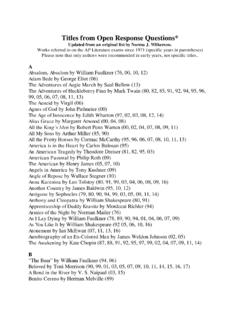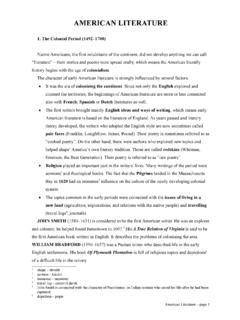Transcription of Analysis of 'Roger Malvin's Burial' (1832), - AmerLit
1 Analysis Roger Malvin s burial (1832) nathaniel hawthorne (1804-1864) Roger Malvin s burial is important as the first instance in American literature of the individuation concept, by which one must first save one s own soul rather than simply depending on Christ or some other savior. Later, Hester and Dimmesdale also exemplify the concept in The Scarlet Letter.
2 The most extreme articulation of the concept is by Emerson in his famous essay Self-Reliance (1841). The inward history of young Reuben Bourne opens in the wilderness on the western frontier of New England in 1725. After an introductory paragraph that establishes an atmosphere of romantic heroism and chivalry, Reuben and old Roger Malvin are making their way home through the forest from a defensive engagement with Indians in which both were wounded. The old hunter grows too weak to go on. Lying in the shadow of a great rock shaped like a gigantic gravestone, Malvin tries to persuade Reuben to leave him there and save himself from certain death.
3 The arguments of Malvin, who is the father of his fianc e, remind Reuben that there were other and less questionable duties than that of sharing the fate of a man whom his death could not benefit. His generous nature would fain have delayed him, at whatever risk, till the dying scene were past, but the desire of existence and the hope of happiness had strengthened in his heart and he was unable to resist them. Reuben gathers Malvin a stock of herbs and roots to eat and some leaves to sleep on, then he binds the handkerchief bandaging his own wound to a sapling on the summit of a great rock and vows that he will return either to save Malvin or to bury him.
4 He leaves with a guilty feeling that sometimes torments men in their most justifiable acts. His departure is endorsed by hawthorne : Who shall impute blame to him if he shrink from so useless a sacrifice? The answer is, Reuben himself. Critics have found this moral problem more complicated than hawthorne probably did. The choice is between a useless chivalric sacrifice and a rational perception of less questionable duties. However, Reuben s own interests coincide with the right moral choice and he distrusts himself. As a Calvinist he believes in his own depravity.
5 Additionally, he is convinced that Malvin is going to be dead before he returns and so he stops rationalizing about bringing back aid. The moral issue of the tale according to hawthorne is not Reuben s leaving Malvin, but breaking his vow. After he makes it back to his settlement and emerges from a coma, he feels ashamed. When his fianc e Dorcas asks him anxiously about the fate of her father, he defends himself against an imaginary accusation, then tells her his story truthfully until she interrupts with the inference that Malvin is dead. Dorcas assumes that he buried her father. Out of shame Reuben implies that he did bury him, telling the lie upon which his tragedy turns.
6 He feels impelled to lie by his groundless sense of guilt, by the self-distrust that follows from the doctrine of total depravity, and by his fear of losing the love of Dorcas. He permits himself to be made a hero in the settlement and he marries Dorcas, restrained from confessing his lie to a severe and rigid Puritan community by an understandable moral cowardice similar to Dimmesdale s: ..pride, the fear of losing her affection, the dread of universal scorn, forbade him to rectify this falsehood. His evaluation of his situation accords with hawthorne s: He felt that for leaving Roger Malvin he deserved no censure.
7 His presence, the gratuitous sacrifice of his own life, would have added only another and a needless agony to the last moments of the dying man; but concealment had imparted to a justifiable act much of the secret effect of guilt; and Reuben, while reason told him that he had done right, experienced in no small degree the mental horrors which punish the perpetrator of undiscovered crime. Reuben s irrational guilt is compounded by his concealment, leading to his primary sin, the breaking of his vow to Malvin. He becomes a secret sinner like Dimmesdale, Parson Hooper and Goodman Brown.
8 Although their situations are different, each of these Puritans is led into sin by the impact upon his psyche of the Calvinist doctrine of total depravity, which could not fail to cause miserable distortions of the moral nature. After his lie, Reuben is unable to keep his vow to bury Malvin because of his superstitious fears of the wilderness, which to the Puritans was the domain of Satan. Year after year he is harried by his conscience to go back and redeem his vow. Reuben the secret sinner becomes isolated, selfish and misanthropic. His prosperity declines into ruination and he is ultimately forced to seek a new life by going west into the wilderness with Dorcas and their son Cyrus, a boy of fifteen.
9 The boy is loved by his father as if whatever was good and happy in his own nature had been transferred to his child, carrying his affections with it. They set out by some design or coincidence in early May, almost on the anniversary of his unfulfilled vow to go back and bury Malvin before the body was eaten by wild animals or abused by Indians. The unfulfilled vow is like a serpent gnawing into his heart. For five days they travel into the dark heart of the forest. Reuben is drawn back toward the place where he left Malvin, on this very date years ago. Where am I? Whither am I wandering? Where did I leave him?
10 When he and Cyrus go out hunting for game in different directions, Reuben strays rather like a sleep walker. At that time, the word unconscious had not been used in the English language. The word subconscious had been used nine years before, in 1823, by the British essayist Thomas DeQuincey to render his experiences under the influence of opium. Reuben is under the influence of guilt. Unable to penetrate to the secret place of his soul where his motives lay hidden, he believed that a supernatural voice had called him onward, and that a supernatural power had obstructed his retreat.











